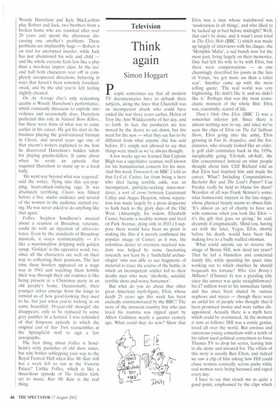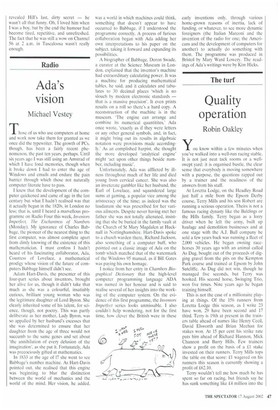Television
Think again
Simon Hoggart
People sometimes say that all modern TV documentaries have to debunk their subjects, along the lines that Churchill was an incompetent drunk who could have ended the war three years earlier. Helen of Troy the Ann Widdecombe of her day, and so forth. In fact, the producers are less moved by the desire to cut down, but the need for the new — what they say has to be different from what anyone else has said before. It's simply not allowed to say that things were much as we've always thought.
A few weeks ago we learned that Captain Bligh was a superlative seaman, well known for his humanitarian concern for his men. And this week Timewatch on BBC 2 told us that Lt-Col. Custer, far from being a hero who died facing terrible odds, was an incompetent, publicity-seeking mass-murderer, a sort of cross between Lieutenant Calley and Angus Deayton, whose reputation was made largely by a press desperate to hark back to the glory days of the Old West. (Amazingly, his widow, Elizabeth Custer, became a wealthy woman and lived on Park Avenue, dying only in 1933.) I suppose there would have been no point in making the film if it merely confirmed the popular image of Custer; as it was, the relentless desire to overturn received wisdom was helped by some fascinating research, not least by a 'battlefield archaeologist' who was able to use fragments of material to trace the course of the battle, in which an incompetent soldier led to their deaths men who were 'alcoholic, suicidal, terrible shots and worse horsemen'.
But what do you do about that other great American myth-figure, Elvis, whose death 25 years ago this week has been excitedly commemorated by the BBC? The story of the innocent country boy who just loved his mamma was ripped apart by Albert Goldman nearly a quarter century ago. What could they do now? Show that Elvis was a man whose watchword was 'moderation in all things', and who liked to be tucked up in bed before midnight? Well, that can't be done, and it wasn't even tried in The Elvis Mob (BBC ) which was made up largely of interviews with his claque, the 'Memphis Mafia', a sad bunch now for the most part, living largely on their memories. One had left his wife to be with Elvis, but there were compensations — as one charmingly described his jousts in the lists of Venus, 'we got more ass than a toilet seat'. Another came up with the most telling quote: 'The real world was very frightening. He didn't like it, and we didn't like it.' Perhaps that was the most iconoclastic moment of the whole film: Elvis was, essentially, scared of life.
There's Only One Elvis (BBC 1) was a somewhat inferior job. Since there is almost nothing new to say, and since we've seen the clips of Elvis on The Ed Sullivan Show, Elvis going into the army, Elvis gyrating in Fun In Acapulco, and the Jordariaires, who already looked like an elderly golf club committee back in the 1950s, inexplicably going `Uh-huh, uh-huh', the film concentrated instead on what people thought about him. Cliff Richard told us that Elvis had inspired him and made his career. What? Including Congratulations, Bachelor Boy and The Lord's Prayer? Can Presley really be held to blame for them? Weirdest of all was Frank Skinner's somewhat homoerotic interest in the late singer, whose physical beauty seems to obsess him. 'It's almost an act of charity to have sex with someone when you look like Elvis — it's the gift that goes on giving,' he said, dreamily if enigmatically. Mind you, having sex with the later, Vegas, Elvis, shortly before his death, would have been like making love to a badly stuffed ottoman.
What could anyone say to reverse the image of Benny Hill, now dead ten years? That he led a blameless and contented family life, while spending his spare time working out to which charities he should bequeath his fortune? Who Got Benny 's Millions? (Channel 4) was a puzzling title since the answer was quite straightforward: his £7 million went to his immediate family and has since been shared by various nephews and nieces — though there were an awful lot of people who thought they'd been promised money and were rather disappointed. Actually there is a myth here which could be overturned. At the moment it runs as follows: Hill was a comic genius, loved all over the world. But envious and rancorous young comedians with a tenth of his talent used political correctness to force Thames TV to drop his series, leaving him to die alone and uncared for. The villain of this story is usually Ben Elton, and indeed we saw a clip of him asking how Hill could chase women comically across parks while real women were being harassed and raped every day.
I have to say that struck me as quite a good point, emphasised by the clips which revealed Hill's last, dirty secret — he wasn't all that funny. Oh, I loved him when I was a boy, but by the end the humour had become tired, repetitive, and unrefreshed. The fact that he was still a wow on Channel 56 at 2 a.m. in Tuscaloosa wasn't really enough.































































 Previous page
Previous page